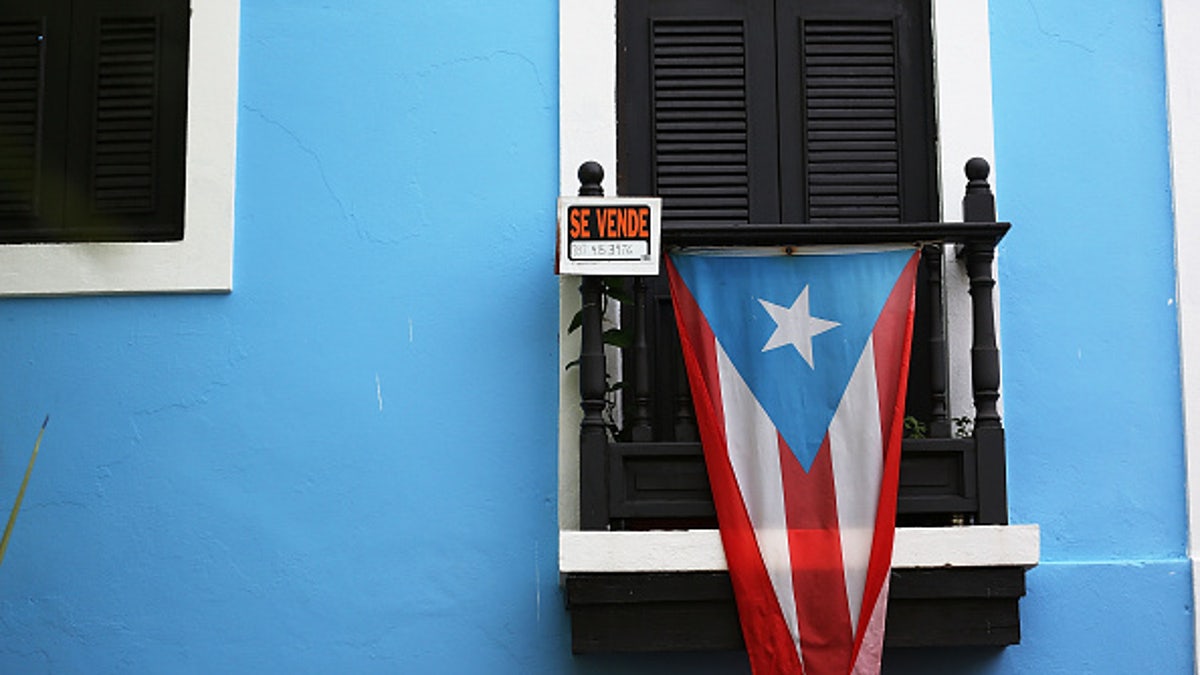
SAN JUAN, PUERTO RICO - JULY 01: A for sale sign is seen hanging from a balcony next to a Puerto Rican flag in Old San Juan as the island's residents deal with the government's $72 billion debt on July 1, 2015 in San Juan, Puerto Rico. Governor of Puerto Rico Alejandro GarcÃa Padilla said in a speech recently that the people of Puerto Rico will have to make sacrifices and share the responsibilities to help pull the island out of debt. (Photo by Joe Raedle/Getty Images) (2015 Getty Images)
Gov. Alejandro Garcia Padilla this weekend reiterated that his priority is to strengthen the Commonwealth of Puerto Rico and called on all Puerto Ricans to unite against a eight-year recession and a 73 billion dollar debt he has deemed “unpayable.”
To shouts of “four more years,” Garcia Padilla made the call to action during his message celebrating the 63rd anniversary of the Constitution of the Commonwealth of Puerto Rico – known as the Estado Libre Asociado (Free Associated State), or ELA.
Governor Luis Munoz Marin proclaimed the ELA on July 25, 1952. It made the island an unincorporated territory of the United States with a Constitution that afforded it a degree of autonomy. It cemented the island’s commonwealth status, promising Puerto Ricans a future of progress and prosperity.
In his message, Garcia Padilla made it clear that the commonwealth is still the best political solution to Puerto Rico’s status.
“We inherited a colossal crisis that no government has ever inherited. We have to face it in order to develop the commonwealth to the maximum,” he said.
“It needs to grow and reach a climax. To achieve this change, we must be fair to all ideological sectors. And we will do so together, respecting those who think differently, in search for the good of all,” he added.
Still, many believe that the main culprit of Puerto Rico’s current debacle is the commonwealth status itself, that euphemistic condition known as the “Free Associated State,” and that the time has come for a change.
More than six decades after Munoz Marin ushered in this new association with the United States, Puerto Rico is not the island he envisioned.
Shackled by the burden of a colonial status, a deteriorating economy heavily in debt, a soaring crime rate and the first sustained population decline since becoming a territory of the United States, it is no longer the U.S. “the showcase of the Caribbean.” It seems to have become more of a false miracle.
Santos Negron Diaz, a prominent Puerto Rican economist, recently wrote in the nationalist Puerto Rican newspaper Claridad:
“The economic crisis has revealed the political crisis and forces us to think that without an effective transition that provides us better and more effective instruments of economic policy, every effort toward an economic recovery will be condemned to fail. We can not continue to pour new wine in old wineskins.”
“Cognitive dissonance 101, a la Boricua,” said Monica Perez, an environmental expert.
“But what can you expect from a compromise that was foisted on Luis Munoz Marin, who upon entering the governor’s office realized that Puerto Rico could not become independent economically, after 50 years of big sugar buying up all the farm land and dislocating all the small farmers.”
Rafael Antonio Ruiz Ayala, a lawyer now living in the United States, puts it bluntly. “The ELA was good for only one thing – to carry United States' luggage.”
“I think that the commonwealth was a good exercise in self-determination within the historical context of its inception,” said Federico Rodriguez, a humanitarian living in Laos.
“You can argue that it’s a 'colony in disguise' and that the economic policies of the U.S. curtailed its growth, fostered a culture of dependency—a welfare state, so to speak—, and created a sub-class of U.S. citizens,” he said.
“At the risk of sounding ageist, I think that at 63 the commonwealth is approaching retirement. It is “exhausted” and, given its record, it’s time for it to step down and allow a new status or political structure to replace it. As our old folks often say: “Se acabó el pan de piquito.” That is the end of that.
Or as Elizabeth Sabater put it: “The ELA has been in the grave a long time now.”
